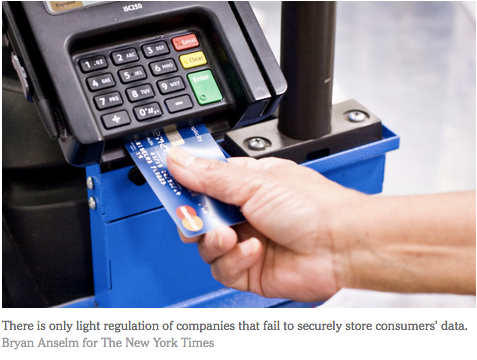Equifax, you had one job. Your only purpose as a corporation, the reason you were created and remain a going concern, is to collect and maintain people’s most private financial data.
Now you have fallen down on your only job — and spectacularly so. Hackers penetrated the spectral gauze of security surrounding your website, and over the course of nearly two months, they made away with the personal information of as many as 143 million Americans. It is the most important financial data available on any of us — our names, birth dates, Social Security numbers, home addresses and in some instances a lot more — and it was just sitting there on your site, all but wrapped up in a red bow.
So, Equifax, I have to ask: Now that you have failed at your one job, why should you be allowed to keep doing it?
If a bank lost everyone’s money, regulators might try to shut down the bank. If an accounting firm kept shoddy books, its licenses to practice accounting could be revoked. (See how Texas pulled Arthur Andersen’s license after the Enron debacle.)
So if a data-storage credit agency loses pretty much everyone’s data, why should it be allowed to store anyone’s data any longer?
Scrambling to Dig Out of the Equifax Mess
In the meantime, here’s hoping that this breach is the nudge you need to finally sign up for permanent freezes on your credit files. I’ve used them for years, and here’s how they work. You sign up (and pay some fees, because you knew it wasn’t going to be free to protect data that you didn’t ask these companies to store, right?) at Equifax’s, Experian’s and TransUnion’s websites. Christina Bater, managing director at Barrett Asset Management in New York, suggests freezing your file at the little-known company Innovis, too. Hey, why not?
Once you do (and it may take a little time to complete the process), the bureaus are not supposed to release your credit report to any company except the ones that already have you as a customer. Why is this important? When a thief shows up with your Social Security number and address to apply for credit in your name, the lender will go to fetch your credit report before anything else happens. If it can’t retrieve the report because of the freeze, then no new account for the thief.
You can thaw your freeze every time you want to apply for new credit by using a personal identification number that the companies give you, which you absolutely should not lose. This costs a few more dollars. (Would it kill Equifax to waive these fees for a while, given the circumstances? Or how about forever?) The process is annoying, but it takes only about 15 minutes to do this at all three of the big agencies. Those precious minutes, by the way, are also why the credit bureaus hate freezes. They gum up the works and make it harder for them to peddle your files to credit card companies and such, thus making ever more money off your data.




